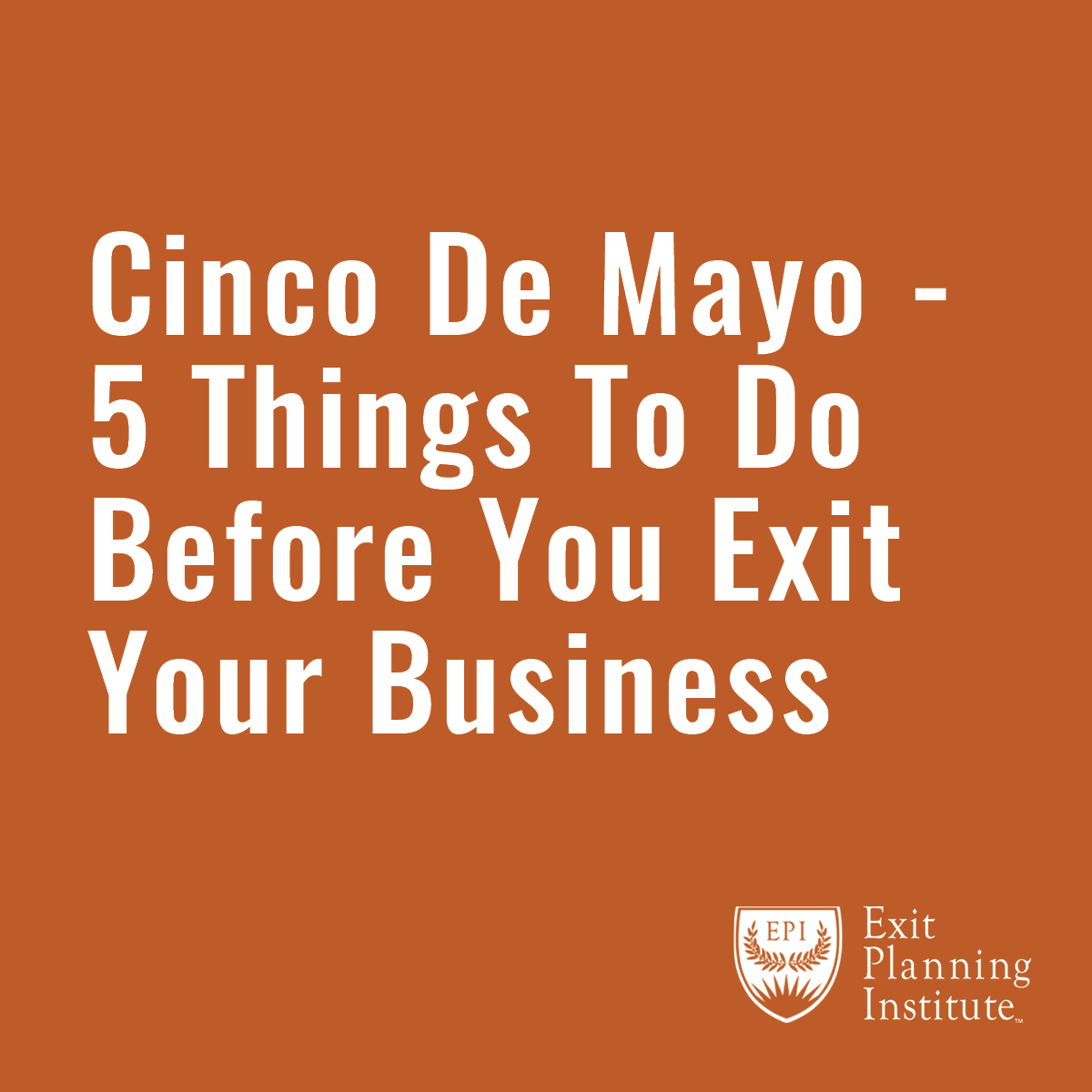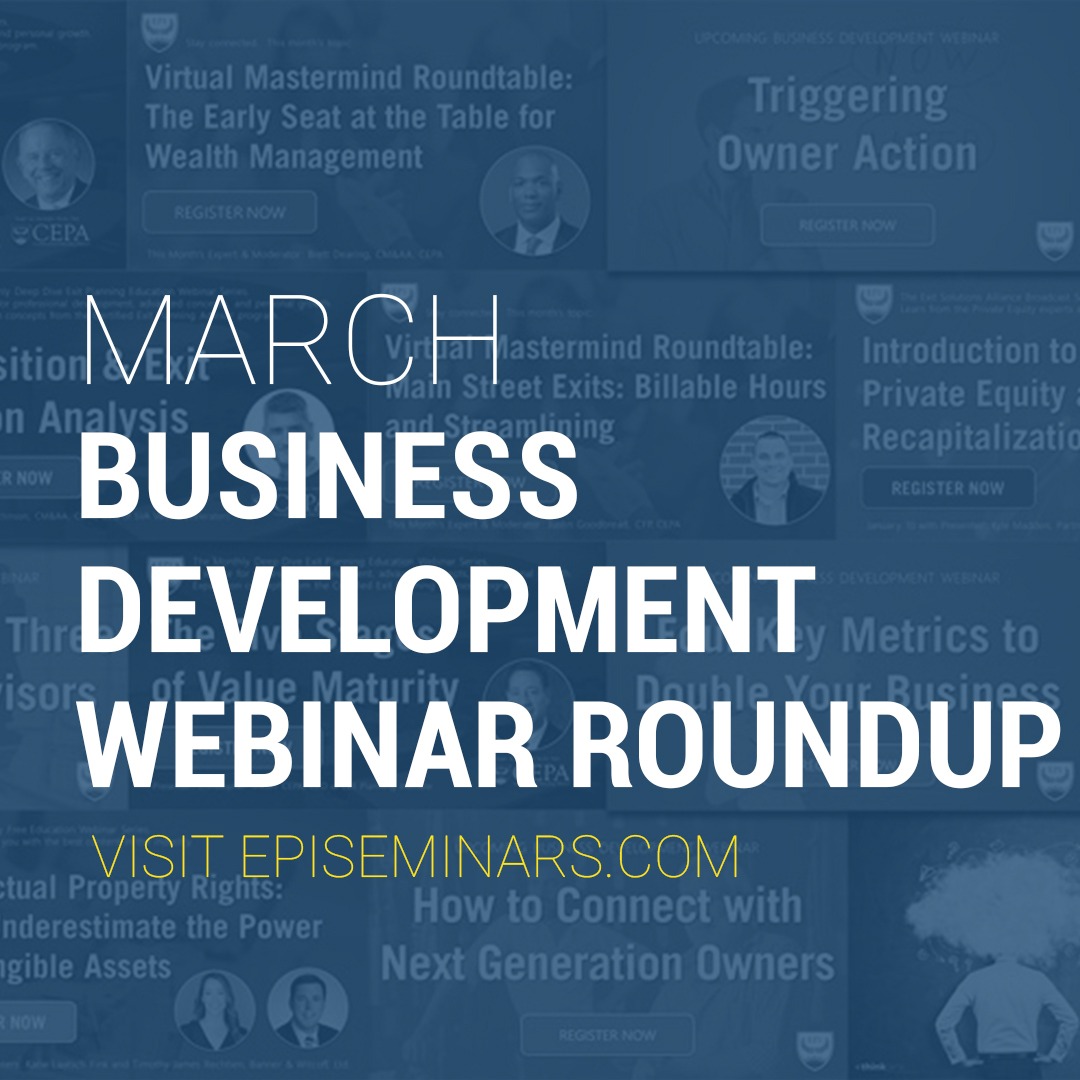
THE EXIT PLANNING BLOG
Keep up-to-date with exit planning, succession planning, industry trends, unique specialty insights, and useful content for professional advisors and business owners.
Share this
Emotional Considerations for Transitions
by Edwin Mysogland on April 1, 2018

This article was contributed by a guest author, Edwin Mysogland, CVA, CEPA, CMEA, SBA
As entrepreneurs, we often think ‘we are going to be happy when…’ But selling a company isn’t a ticket to happiness for the rest of your life. The emotional complexity of the sale of a business cannot be ignored. The business has been a part of you and maybe your family, and perhaps it has been a fixture in the community for several generations. Or, it just seemed like a good idea at the time when you bought or started it. Regardless of how long you have been an entrepreneur, you’re charged with caring for this baby known as a business. You fed it, you nurtured it, it brought you joy (hopefully), and it had its disappointments. Perhaps you resent it for the time it took away from your family or the strain it put on your relationships. Hopefully, you have nothing but fond memories and this “asset” served you well. My assumption is that regardless of your feeling about the business, one thing is for certain – you will feel a loss when you sell.
Have you heard of seller’s remorse?
Seller’s remorse is when a seller changes his/her mind about selling. Sometimes it is about motivation, value or fear of what comes next, among other reasons. What you need to know is that it is real and you have to make sure that you emotionally check in with yourself. Why? According to the Exit Planning Institute, 76 percent of business owners who sold their businesses profoundly regretted selling within a year.
Can you imagine going through this whole process only to wish you had not done so?
Have you thought about what you are going to do?
Maybe not with the money, but with your time. So many business owners have been so consumed with their business for so many years that they don’t know what to do with their time after they sell. When I was in the business brokerage industry, one of the business brokers I hired for our practice came from a call from his wife who wanted him to find something to do! It is a serious challenge for business owners having nowhere to go after selling a business. It is very tough and why so many sellers unretire to buy another business.
So let’s talk a little about the mechanics of loss…
Whether it be a pet, person or business, when it is no longer in your life there is void. Some choose to handle time in healthy ways like hobbies, volunteering, mentoring and reconnecting with others. However, some turn to passing the time in unhealthy ways. Time doesn’t stop, so how you plan to pass your time is integral to this process. Here are some considerations.
#1: How Will You Spend Your Time?
Regardless of how long you have owned and operated your business, there is a structure and routine to your day as well as your weeks and months. Can you imagine not having a schedule or standing meetings? Imagine the ideal day for you without the business. Some owners say they will golf or play tennis every day. Unfortunately, that is not a lasting solution. That passed the time, but it lacked the emotional connection that you will be seeking to replace. As difficult as the exercise may be, look at the business and what source of satisfaction does it bring you? For example, if you were the one who loved the routine of going to work (like me), and after you had left the business you were volunteering or mentoring on an “as needed” basis – this would not be ideal because you valued the structure of your days. Finding something that you could do on a consistent basis would most likely provide the satisfaction you seek.
#2: How Will Others View You?
One of my dearest friends always says, “It is better to be seen than viewed.” However, in this context, it is your identity that was in the business. So how do you believe others will treat you after you have left? So many business owners that have been in the business for years have grown up with customers, competitors, vendors, etc., and those people are more to you than the roles for which they served the business. Will they remember you if they are staying while you are moving to the next phase of your life?
One of the more interesting articles I recently read was “What Will You Put on Your Business Card After You Have Exited Your Business?” by Larry Gard, Ph.D. Dr. Gard indicated that if you are concerned that people will treat you differently or with less respect, you should consider what sort of reaction you would like to receive. If you want to be identified for more than the business, you have to provide enough information that will start a conversation. While it seems to be for the retiree, it is as much or more applicable for anyone who is considering an exit or has exited a business. Whether it is the business owner who returned to the workforce as a W-2 employee, or the entrepreneur running full speed into the next chapter – how you are perceived is material. Despite what you may think, the business is a part of who you are but is not who you are.
#3: Having Your Head in the Sand
Assuming that you will successfully transition out of your business is dangerous. There are several fallacies and misconceptions that business owners typically have:
The Pessimistic Position
- There is no one who can run it like me
- There is not a buyer for this business
- There is no market for this business
Or the opposite…
The Know It All
- I know the value of the business
- I know that all kinds of buyers would want this business, I get letters all of the time.
- One of my kids will want this business
- I can do an ESOP (Employee Stock Ownership Plan)
Both states of mind are dangerous because they lack knowledge. Likely, no preparation has been done. “We’ll figure it out as we go” is not a strategy and will tend to scuttle the process when reality sets in as the transition execution move forward and provide tangible evidence of the lack of planning.
#4: Is There a Post-Exit Role for You?
In most sales or transitions, the owner transition is important. In fact, the smaller the business, the more important the transition involvement period. However, what I’m referring to is what are you going to do after you aren’t needed regularly? What is your role going to be at home, your church, or serving your community? Don’t discount the importance of the departure of one role and the entrance to another.
#5: Family Considerations?
You might assume that I am referring to your blood family, but I’m referring to the family of employees that you may have. You believe that you have an obligation to continue to provide them a livelihood and if you aren’t there, who is going to do it? I know of many business owners who are paralyzed to enter this process because they NEED to provide. If you are over sixty, here is a hint…They are wondering what you are going to do with the business when you retire. Hopefully, you care a great deal for those who work for you. If you are that business owner, care enough to plan so that your employees are taken care of after you transition from the business.
We have all behaved irrationally toward something important and shouldn’t have. The same holds true for this process. As the time grows closer to exiting the business, the level of anxiety will amplify. If it is left to its own devices, it will work at minimum – slow the process, and at worse – will scuttle the deal.
Conclusion
Seller’s remorse is real and not being emotionally prepared to transition the business is as dangerous as the value and financial matters. The emotional component of the sale/transition is worth considerably more than the money you will receive for the business.

Ed Mysogland is President and Managing Partner of Legacy Transition Advisors, LLC. The firm is an Indiana-based company that provides exit planning and business valuation services for small and mid-sized privately held business owners who seek to grow and improves their business. Recognizing the tremendous economic impact that owners have, the company is committed to helping its clients through critical decisions and implement value-enhancing solutions. Mr. Mysogland is President of the Central Indiana Chapter of the Exit Planning Institute and leads the State of Owner Readiness research efforts in his local business community.
Mr. Mysogland can be contacted at (800) 430-1442 or by e-mail to ed@legacytransitionadvisors.com.
About Exit Planning Institute:
 The Exit Planning Institute (EPI) is an education company that provides exit planning education to advisors and middle market business owners. We view exit planning as a strategy, not an event.
The Exit Planning Institute (EPI) is an education company that provides exit planning education to advisors and middle market business owners. We view exit planning as a strategy, not an event.
EPI leads the professional services profession with the best industry content, ongoing support, and owner education platform, all of which align with our mission: Change the outcome.
Only 2 out of every 10 businesses that come to market actually sell. We want to increase the number of saleable businesses.
Only 30% of family businesses successfully transition to the second generation, only 12% transfer to the third, and the success rates diminish from there. We want to improve those intergenerational transitions.
Of those that succeed in the sale of their business, 75% experience “profound regret” within one year of exiting their business. We want to understand why and create strategies that achieve profound success, wealth, and satisfaction.
EPI is an education company, powered by an elite community of top advisors and owners, all focused toward creating a valuable, transferable future for the business marketplace.
- Change your outcome. Learn more at www.Exit-Planning-Institute.org.
- Educate business owners. Learn more at www.OwnerReadiness.com.
- Become the Advisor of the Future. Learn more at www.EarnCEPA.com.
Share this
- Blog (547)
- CEPA (429)
- exit planning (249)
- CEPA community (188)
- Business Owner (173)
- Exit Planning Summit (99)
- EPI Chapter Network (89)
- Value Acceleration Methodology (81)
- Exit Planning Partner Network (76)
- EPI Announcement (50)
- Content (48)
- Webinars (37)
- Excellence in Exit Planning Awards (34)
- Marketing (30)
- 2024 Exit Planning Summit (28)
- 5 Stages of Value Maturity (26)
- Books (24)
- EPI Academy (24)
- EPI Team (22)
- Exit Planning Teams (22)
- Leadership (21)
- 2023 Exit Planning Summit (20)
- family business (20)
- women in business (19)
- Intangible Capital (18)
- Exit Options (17)
- Black Friday (16)
- CPA (15)
- Walking to Destiny (15)
- Chapters (14)
- State of Owner Readiness (14)
- Chris Snider (12)
- National Accounts (12)
- Small business (12)
- charitable intent (12)
- personal planning (12)
- Financial Advisors (11)
- Season of Deals (9)
- 5 Ds (8)
- About us (8)
- Podcast (8)
- Scott Snider (8)
- Insiders Bash (7)
- Christmas (6)
- Exit Planning Content Library (6)
- Case Studies (5)
- Owner Roundtables (5)
- Three Legs of the Stool (5)
- Value Advisors (5)
- financial planning (5)
- Awards (4)
- Circle of Excellence (4)
- EPI Thought Leadership Council (4)
- Exit & Succession (4)
- Five Ds (4)
- executive training (4)
- Owners Forum (3)
- author (3)
- forbes (3)
- DriveValue (2)
- Exit Is Now Podcast (2)
- Peter Christman (2)
- Veteran (2)
- Whitepapers (2)
- Annual Exit (1)
- Business Owners Forum (1)
- SOOR (1)
- business consultants (1)






